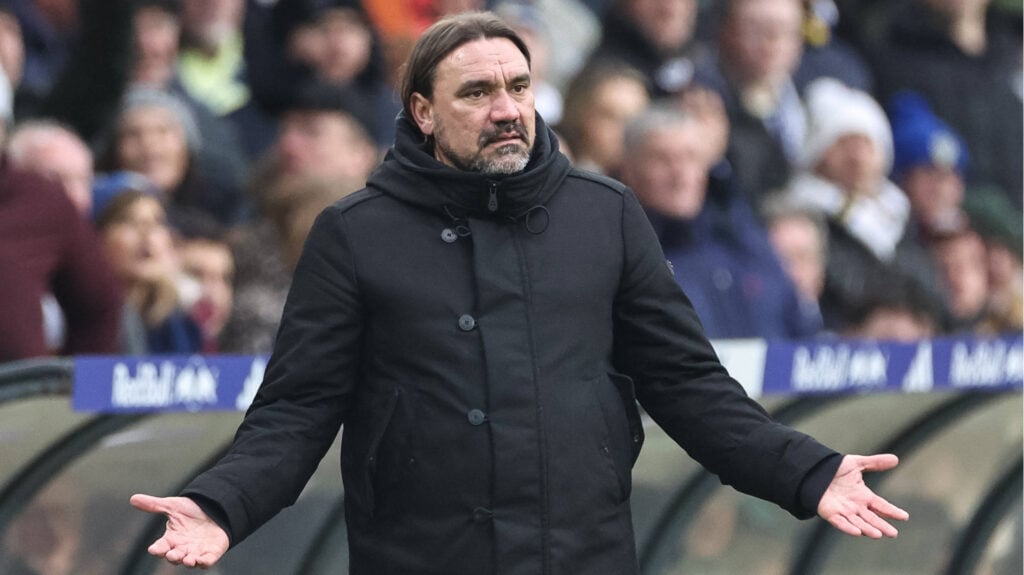
(Credit: Imago)
Thu 17 July 2025 22:10, UK
Leeds United manager Daniel Farke must adapt his playing style ahead of the Premier League campaign.
Whilst Farke’s style evidently worked in his two years in the Championship with Leeds, amassing a combined 190 points, the German manager must change his ways next season.
Despite his success in West Yorkshire, Farke has been criticised at times for his stubbornness in his team selection and poor tactical flexibility.
These traits from the manager have to be a thing of the past going into next season if Leeds want to see Premier League football at Elland Road for more than just one year.
 Farke must be willing to adapt to help Leeds’ survival hopes (Credit: Imago)Full-backs must be more defensively responsible
Farke must be willing to adapt to help Leeds’ survival hopes (Credit: Imago)Full-backs must be more defensively responsible
During United’s Championship title-winning campaign, Junior Firpo and Jayden Bogle were simply outstanding.
Due to Leeds’ stranglehold of the majority of games they played, they were allowed to bomb forward, effectively acting as extra wingers and creating a numerical advantage for the Whites in the final third.
Combined, the pair contributed a whopping ten goals and 14 assists, but this will not be the case next season.
Farke instructing his full-backs to push on this high again would be tactical suicide, given the strength of the opposition Leeds will be facing.
This could be a reason why Firpo’s deal at Elland Road was not extended, with the attacking left-back struggling the last time United were in the top flight.
If Gabriel Gudmundsson provides more defensive security on the left, this could give Bogle the license to go forward and cause issues in the opposition’s box without the fear of getting exposed in transition.
Bogle and Gudmundsson must be smart when choosing their times to attack, and the pre-season fixture against Manchester United could be the perfect place to begin this experiment.
Bin off the 4-2-3-1 or recruit a new number ten
Aside from a play-off fixture away at Norwich in his first season in charge that springs to mind, Farke has always deployed a 4-2-3-1 system to start games during his tenure as Leeds boss.
Brenden Aaronson mainly occupied the position as the Whites’ number ten last season, with the American enduring a frustrating campaign.
To put it simply, Aaronson did not possess the physicality and technical ability to thrive at Leeds in the Championship, so continuing to play him in the Premier League would not be a wise decision from Farke.
With the seemingly inevitable arrival of Sean Longstaff and Anton Stach also being linked with a move to LS11, Farke has more than enough players at his disposal to play a flat three in midfield, with Ethan Ampadu and Ao Tanaka already being some of Leeds’ most impressive players.
If Farke insists on continuing to play his favoured 4-2-3-1, then recruiting a new number ten, with technical quality but also the athleticism to help out defensively, will be a priority.
 Aaronson has previously struggled for Leeds in the Premier League (Credit: Imago)Improved set-piece presence
Aaronson has previously struggled for Leeds in the Premier League (Credit: Imago)Improved set-piece presence
For the most part, Leeds’ attacking of set-pieces under Farke has been abysmal.
Whilst Joe Rothwell’s quality helped to remedy this at crucial points last season, like in the game against Sunderland at Elland Road, for example, the midfielder has completed a move to Rangers.
Recruiting someone to replicate Rothwell’s dead-ball specialities would be a useful addition to the squad, with Leeds needing to maximise their opportunities from set pieces next season.
The free-flowing team goals like the one Aaronson scored at Pride Park against Derby will be a rarer occurrence next season.
Leeds need to focus on putting the ball in the net by any means necessary, given they will be under the cosh for most of their games.
Meaning centre backs, Jaka Bijol, Joe Rodon, Pascal Struijk and Sebastiaan Bornauw will have important roles to play from an attacking standpoint next season.
Become a team that thrives in transition
Under Farke, Leeds have already proved to be a force in transition; however, these opportunities rarely presented themself, given most teams deployed a low block against Leeds, due to their dominance in possession.
United will likely have more opportunities in transition next season, with the more dominant Premier League opposition likely having most of the ball during games.
Farke must continue to insist that the likes of Dan James, Willy Gnonto and Largie Ramazani break using their blistering pace before having the composure and quality to pick out the correct final ball.
This approach will also benefit Joel Piroe, who, whilst possessing excellent finishing ability, struggles when playing with his back to goal.
 Joel Piroe dominated for Leeds (Credit: Imago)
Joel Piroe dominated for Leeds (Credit: Imago)
The Dutchman arriving on the edge of the box to sweep home counter-attacking moves could be a formula that Farke chooses to specialise in as Leeds look to avoid the drop.
For this approach to be even more effective, another striker and winger would be welcome additions at Elland Road, with both players needing to have athletic profiles.
Igor Paixao and Rodrigo Muniz may be the two missing pieces of the puzzle to round out Farke’s forward line and thrive in his new attacking system.
Sign up for the MOT Leeds News WhatsApp channel and turn on notifications to have all the latest, breaking Leeds United news sent straight to your phone.
Related Posts
